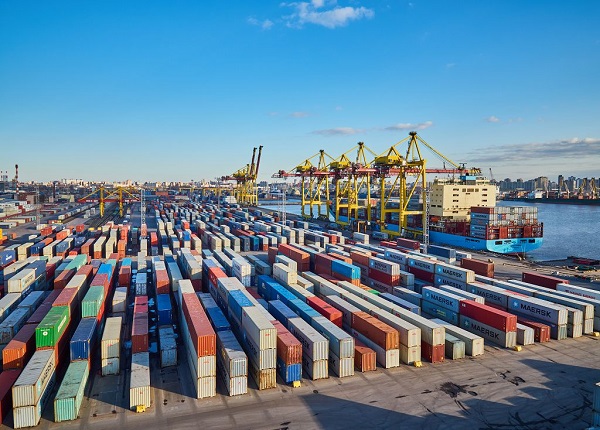
In the first half of 2022, consolidated marine container throughput of Global Ports fell by 22.6%, year-on-year, to 611 thousand TEU, according to the company’s statement.
“Amid the global and local geopolitical tension and considerable decrease of calls by the key sea lines to the ports of Russia, the country’s container market in the Baltic Basin and the Group’s terminals in the North-West region showed a considerable decrease of container, car and RoRo cargo handling in the second quarter of the year while container handling in the Far East including VSC was more stable although affected by a negative impact of epidemiological constraints in China,” says Global Ports.
A considerable fall was registered at Ust-Luga Container Terminal (-43%, 9 thousand TEU), First Container Terminal (-36.4%, 204 thousand TEU) and Petrolesport (-38.7%, 124 thousand tonnes TEU). At the same time, Vostochnaya Stevedoring Company in the Far East showed an increase of container throughput by 9.4% to 274 thousand TEU.
Handling of non-containerized cargo also reduced at the Group’s terminals: Handling of RoRo cargo dropped almost three times to 4.3 thousand units, cars — 2.9 times to 18.4 thousand units, bulk cargo — over two times to 1.2 million tonnes. Meanwhile handling of containerized cargo at Finnish ports (Global Ports is a part of a JV at the terminal in Kotka and Helsinki) rose by 36.6% in H1’22 (54.4 thousand TEU). Handling of dry bulk cargo at Moby Dik terminal in Kronshtadt fell by 17.3% to 117.3 thousand tonnes, at Yanino — by 47.8% to 93.7 thousand tonnes.
According to Global Ports, Russia’s container market has decreased by 17.3% to 899 thousand TEU in the first half of 2022. The steepest fall was seen in the Baltic region – by 38.9% to 770 thousand TEU. In the South of Russia, container throughput fell by 6.9% to 423 thousand TEU. The growth was demonstrated by northern ports and the Far East terminals – by 16.9% (79 thousand TEU) and 5.4% (936 thousand TEU) accodingly. Throughput in the Baltic Basin in 2022 is expected to fall considerably, year-on-year, while the Far East market is expected to be more stable, the Group says without providing any absolute figures.
Global Ports is going to concentrate on handling of non-containerized cargo in the North-West region and on cost management measures while VSC is to focuse on enhancement of operational efficiency amid the growing demand for cargo transportation via the Far East ports.
Global Ports Investments PLC is the leading operator of container terminals in the Russian market by capacity and container throughput.
Global Ports’ terminals are located in the Baltic and Far East Basins, key regions for foreign trade cargo flows. Global Ports operates five container terminals in Russia (Petrolesport, First Container Terminal, Ust-Luga Container Terminal and Moby Dik in the Russian Baltics, and Vostochnaya Stevedoring Company in the Russian Far East) and two container terminals in Finland (Multi- Link Terminals in Helsinki and Kotka). Global Ports also owns an inland container terminal Yanino Logistics Park located in the vicinity of St Petersburg.
Global Ports’ major shareholders are Delo Group, one of the largest private transportation and logistics holdings in Russia (30.75%), and APM Terminals B.V. (30.75%), whose core expertise is the design, construction, management and operation of ports, terminals and inland services. 20.5% of Global Ports shares are traded in the form of global depositary receipts listed on the Main Market of the London Stock Exchange (LSE ticker: GLPR).



